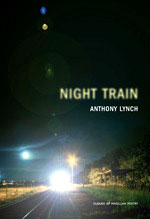
Night Train by Anthony Lynch
Clouds of Magellan, 2011
Anthony Lynch is a publisher, editor at Deakin University, reviewer, prose writer and widely anthologised poet. His contribution to Australian poetry is admired through his work with the journal Space and now through Whitmore Press. His book of short stories, Redfin (Arcadia, 2007) was shortlisted for the Queensland Premier’s Literary Awards. Uncluttered and moving, stories there show an astute observational eye, a hovering dread and a sense of the unfinished, so that Barry Oakley described them as being a ‘world of tangents’.
Lynch’s first book of poetry, Night Train, contains poetry written with a fine eye for detail and a storyteller’s uneasy observations. Poetry often gives us the interior journey of the poet’s mind as well as the intimations of all they hold dear. His work is subtle, compassionate, eerie and hangs its last lines into the ether, as if we can follow or not, interpret or accept. His voice is one that swerves and climbs, while we view his world as if from the window of a train, often with our breath against the glass, sometimes with the frame down.
There are three sections to this book – Topography, Interiors, Splitting space – and there is a puzzle-nature in determining the intent of some poems which requires multiple readings.
With the word ‘Topography’, we think landscapes, maps and geographies. The poems in this section engage with the natural world, specifically the landscapes of Lynch’s home-place.
The presentation of the ‘real’ is concrete, visceral. There is a richness of image but it is sparsely used. In ‘Topography’,
The canola is fitful, shutting down for half a year before its furious yellow electrifies the fence. Flowering gums are manufacturing magenta, along the drive agapanthus nod and chant We can do this. We can do this.
Lynch has a way of using words that strengthens them as they are presented in a novel, often slanted way: a fox is ‘brushtailing into dusk’ and an animal wail is ‘scoring’ the night. This skill brings an energetic newness to words.
Corio Bay, Geelong, Point Lonsdale, Queenscliff all light up in his line of vision. He knows them well. On the ferry from Queenscliff to Sorrento:
Out here a dark tin foil unwraps the home town’s confidences as a single strip of empty sun makes an empty mall of a dolphinless sea and with one long, languid step we are thrust toward Sorrento, inviolable in its all-weather whiteness, its occidental logic and unimpeachable veneer ...
In the title poem, ‘Night train’, we are given the slideshow as it will unfold through the book. The ‘clone of self’, foggy anachronisms of the past, the country represented by the You Yangs, ‘industrial gothic’, the city of Geelong, and the personal: ‘The hospital you were born in. / The school where you were clapped / and buggered, the church / where you begged forgiveness. / Your whole life’.
In this poem and in the anthropomorphic ‘Jaguar’, possibly the most visceral poem in the collection, there is an energy charge through the interconnection of memory and idea:
something of the fox and of the cat – discreet and russet, an outsider lying low… a snakepit of hoses ... ... interior a frayed glove with leather seats well-thumbed and smelling of neglected libraries Dash of walnut sans airbag holding a kernel of the old country.
And again in ‘Light’, a gentle loving exploration of day opening, we can see the grip the poet has on small things. The poem is moving in its simplicity and sense of truth:
There it is again, the world turning over in bed. The first magpie undoes the dark, the dog wet-noses our sleep craving the back door. The huntsman leaves off its meditation on wall fixtures ... This is what some call the stark reality of day.
And finally into that domestic world: ‘A plane comes and tells us / of the bigness of things.’









